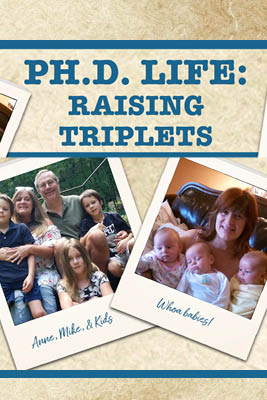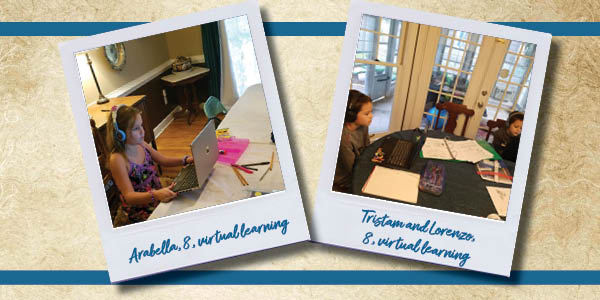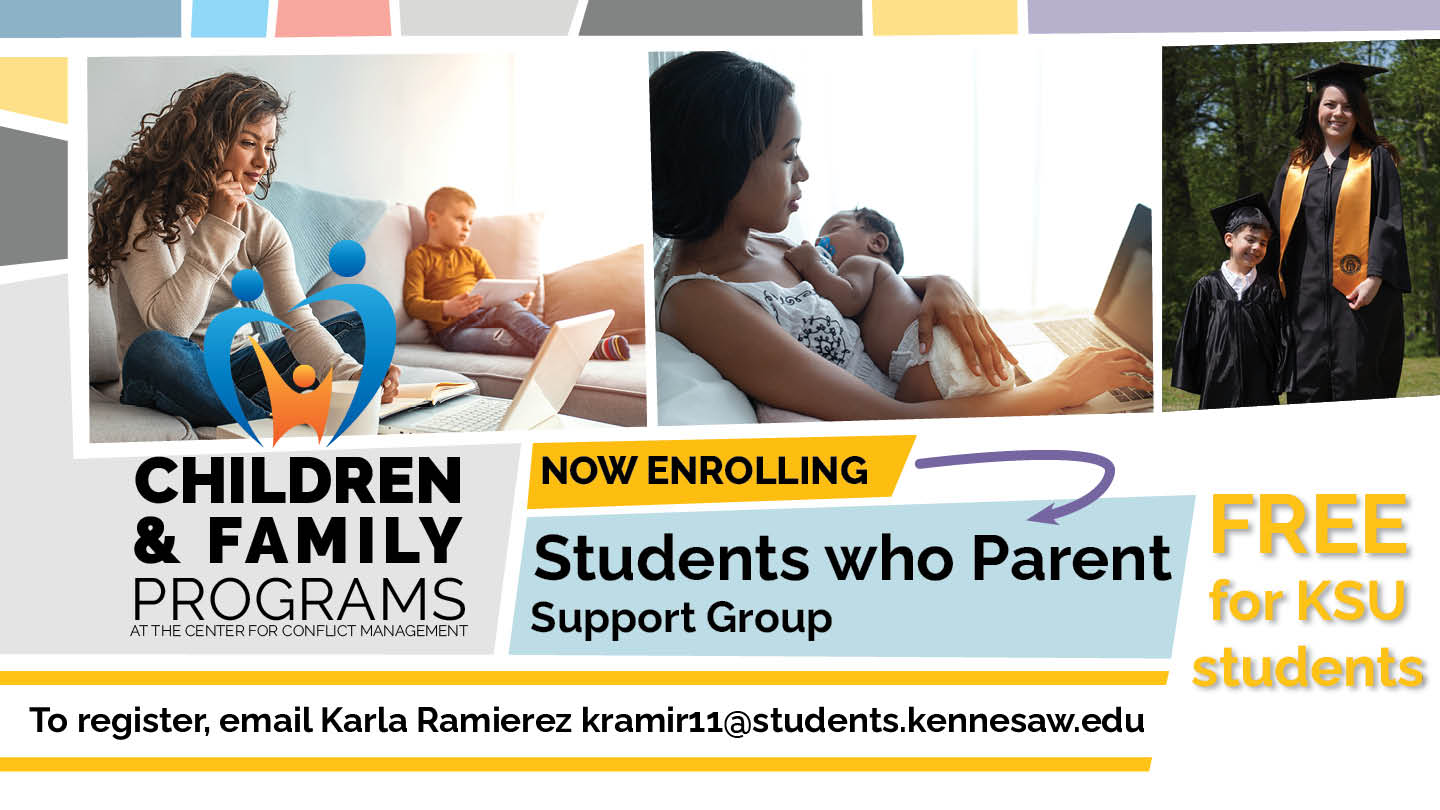Ph.D. Life: Raising Triplets

You think you’re busy? Try raising triplets, earning a Ph.D., and virtual learning
KENNESAW, Ga.
(Sep 1, 2020) — It’s no secret that COVID-19 has disrupted plans for 2020, especially for parents,
but “busy” has an entirely new meaning to two students in the Ph.D. in International
Conflict Management (INCM) program who are parents to two separate sets of triplets.
According to the latest numbers by the Centers for Disease Control and Prevention
(2020), the number of triplet births in 2018 was a mere 3,400 compared to 3,791,712 total
births in the United States. In fact, the triplet or higher birth rate is 93 per 100,000
live births. With those statistics in mind, what are the chances that not one but
two students in the Ph.D. program each have their own set of triplets? We’re going
to go out on a limb and just say it’s extremely rare.
Anne Chance, a 2nd year Ph.D. student, and her husband Mike have three 8-year-old triplets—Tristam, Lorenzo, and Arabella, and Anne also has an adult son, Adam, who has a family of his own. The boys are identical twins and Arabella is their fraternal triplet. With humor in her voice, Anne said, “The neonatal doctor told me that the chances of that occurring were 1 in 70,000. Reason #273 the [last] name Chance is not lucky. Just kidding” (Connelly, personal communication, August 30, 2020).

Chip White is a 2nd year returning Ph.D. student who took some time off when his triplets
were born. He has three 8-year-old triplet girls—Ava and Gigi are identical twins
with a fraternal sister, Emme. Laughing, Chip said, “[I also] have 2 other daughters,
ages 24 and 21. Five daughters…I am creating a GoFundMe page! Kidding!!!” (Connelly,
personal communication, August 30, 2020).
Connecting the Ph.D. Program to Career Goals
Anne and Chip have completely different backgrounds, which is one of the most interesting
aspects of the interdisciplinary nature of the INCM program. Previous to her doctorate
studies, Anne worked for an architecture firm as a preservation practitioner. When
asked why she applied, she said:
When all the conflict around Confederate monuments blew up, I kept thinking there must be a way to resolve this where everyone is content with the outcome. I knew that similar conflicts occur internationally, so I joined the INCM program to find out what role heritage preservation has in conflict and what role it might take in peacebuilding and development. (Connelly, personal communication, August 30, 2020)
Although she loved her job with the architecture firm, she wanted to enjoy more mental
stimulation, increase her marketability, and increase the compensation capacity in
her field. So, she took a risk and applied. Upon acceptance into the program, she received
a 20-hour a week Graduate Research Assistantship which covered her tuition and gave
her the opportunity to write grants for a professor in INCM.
Chip’s background is in national security and he currently works as the Director of
Security for Executive Protection at The Home Depot. He is responsible for all executive
and associate security and travel, domestically and internationally, and all the security
for all Home Depot medium to large events.
When asked about his interest in the Ph.D. program, he said:
My background involves national security, U.S government law enforcement, and corporate security. I am currently focusing on corporate security and their perceptions of risk and their influence on the decision-making of corporations to conduct business in certain areas. Economic development seems to be critical in the cycle of violence, economic development, and poverty. (Connelly, personal communication, August 30, 2020)
Ultimately, Chip applied to the program because of his love of learning, desire to
teach, and for the personal challenge of completing a Ph.D.
Virtual Teaching and Learning During COVID-19 Pandemic
When the pandemic began in the United States and started to hit Georgia in March,
the Governor mandated that everyone who wasn’t considered an essential worker was
sent home to quarantine (Governor Brian Kemp, 2020). Schools were closed and parents
were forced to juggle teaching and working. Anne was likely not alone in her thought,
“Home with my kids? Are you kidding me? I will never get anything done!” (Connelly,
personal communication, August 30, 2020).

Not only are the children attending school virtually, but the majority of the courses
offered in the School of Conflict Management, Peacebuilding and Development are also
virtual. Many graduate students are juggling learning virtually, teaching their kids
virtually, and working. When virtual work and school began in March, many parents had
a go-with-the-flow attitude and a little extra grace for the teachers who were trying
to maintain some normalcy in their classroom. Anne explained it was extremely hard for
her family because each child had a different teacher and each teacher had different
assignments and daily, weekly, or a combination of both styles for announcements.
For Chip’s kids, there were many technical glitches and he realized that the teachers
were just doing the best they could to keep his then 7-year-old girls’ attention.
“The kids were fine…” he says with chuckle and an undertone that insinuated the parents
were not.
Now that the fall semester is also virtual, parents have increased expectations for
distance education organization, but many parents agree that the semester is off to
a rough start of technical difficulties. The biggest looming question is when will
students return and what happens if or when parents’ jobs go back to “normal”?
How Did You Adapt?
Neither Chip nor Anne hired outside babysitters to help juggle their schedules. Anne
admits that her husband was and has been a huge asset in helping her with the children
while she finishes major assignments for her classes. She said she also invested in
a math tutor for the children in the spring so they wouldn’t fall behind for the start
of this year. “Worth every penny!” she exclaims.
Chip, on the other hand, has a job that required constant travel pre-pandemic, but
has been halted due to international and domestic travel bans. He’s grateful to have
the opportunity to spend time with the kids, both older and younger, and also devote
more time to schoolwork. He feels that the move to virtual classes made his time management of
clearing his work calendar that much easier, even if he ultimately prefers in-person
for the personal interaction with faculty and students.
Advice for Parents?
There may not be a parenting manual, especially for triplets in the midst of a pandemic,
but if anyone has some parenting advice to share, Chip and Anne do.
Chip’s advice to parents juggling everything:
It all comes down to time management and priorities. Priorities may have to change, if only temporarily, to get goals accomplished. The difficulty is balancing everyone’s needs (work, home, school) which doesn’t leave a whole lot of time for yourself and that can be psychologically and physically detrimental. Try to have some, no matter how much, downtime to regenerate. (Connelly, personal communication, August 30, 2020)
Anne’s kids are all vastly different. “Lorenzo is a rule follower, Tristam a rule
bender, and Arabella doesn’t give a flip about rules. With different interests, their
degree of interest impacts how they learn. Face-to-face learning was more effective
because it kept them engaged.” To help her family cope through the spring, her children participated in
two cycles of Social Skills Training in the fall and spring and she and her husband
took the paired Behavioral Parent Training through the Children and Family Programs at Kennesaw State University. The parenting class taught them techniques to manage their children’s behavior using
positive reinforcement. She said it was a real lifesaver, especially from March through
June.
Her advice to parents struggling to maintain a bit of normalcy:
I schedule my work and school into my calendar, and I schedule time with my family into my calendar. Then I figure out how to work the out-of-classroom schoolwork into my days. Sometimes I have to forego time with the kids because of conflicting deadlines, but Mike is there in the gap and I try to make it up to them later. Life is not perfect, and I get frustrated sometimes and sometimes depressed. But because of other life experiences, I know this will not last forever. Like the saying goes, “If you are going through Hell, just keep going.” I keep that degree always in front of my eyes because that is where I want to end up. (Connelly, personal communication, August 30, 2020)
Resources to Help You Cope
It’s safe to say that most people are going through some kind of hardship during this
pandemic. Whether it be financial, health, time, work, or family related, many people
are showing empathy more than ever. There are resources in place to help those struggling
with any of the aforementioned aspects, but the School of Conflict Management, Peacebuilding
and Development is proud to offer a free Students-who-Parent support group, created especially for students like Chip and Anne. In the support group, each 60-minute
session will focus on different relevant topics for positive parenting, such as how
to promote positive peer relationships, manage negative behaviors, and how to support children’s virtual
learning during this time of COVID-19. Each participant will receive a Student-Parent
Toolkit which contains resources available at KSU and in the community to support
parents who attend college.
For more information on the support group or other Children and Family skills programs,
visit the Children and Family Programs at KSU.
-Nicole Connelly is the Communications Professional in the School of Conflict Management, Peacbuilding and Development
Resources
Centers for Disease Control and Prevention. (2020, August 31). Births and natality.
National Center for Health Statistics. https://www.cdc.gov/nchs/fastats/births.htm
Centers for Disease Control and Prevention. (2020, August 31). Multiple births. National
Center for Health Statistics. Retrieved from https://www.cdc.gov/nchs/fastats/multiple.htm
Connelly, N. (2020, August). Personal communication, interview of Chip White and Anne Chance.
Office of the Governor Brian P. Kemp. (2020, August 31). 3.14.20: 2020 Executive orders. Retrieved
from
https://gov.georgia.gov/executive-action/executive-orders/2020-executive-orders












